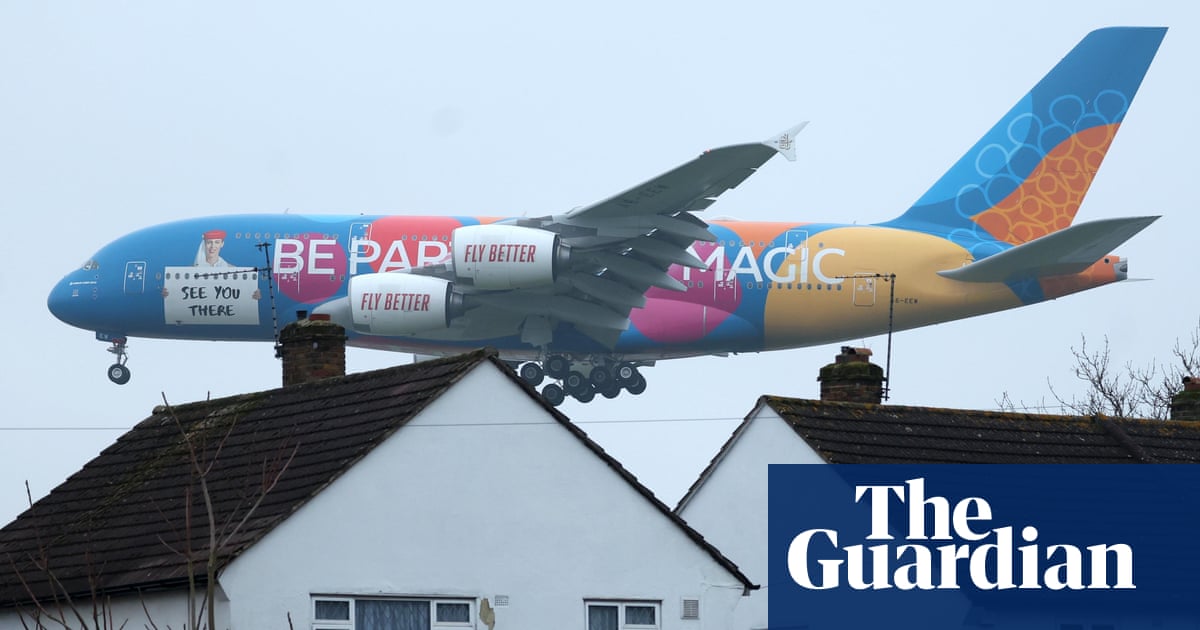Rachel Reeves’s bid to enhuge Heathrow airport could comprise £40 to the cost of an airline ticket, according to the Treasury’s own analysis.
The chancellor’s proposal to minimise the carbon eomitions of a hugeger Heathrow join the engage of sustainable aviation fuels, which experts say are pricey and doubtful to accomplish the scale necessitateed for aviation expansion.
A Treasury cost-profit analysis seen by the Guardian shows that sustainable fuels could incrrelieve the cost of a individual economy airline fare by £37.80 by 2040. There are no set ups to asstateive standard flyers, or those in first or business class, shoulder more of the cost, with ticket prices foreseeed to go up apass the board.
The chancellor drew up the climate set ups in response to criticism from the energy secretary, Ed Miliprohibitd. He is understood to have alerted cabinet colleagues that airport expansion is anticipateed to put the UK in baccomplish of its legpartner tieing carbon budget, which upgrasps the rulement on track to greet its 2050 net zero eomitions aim. One ancigo in source shelp Reeves had been “armamentg ho” about Heathrow since the summer and had been putting presstateive on Miliprohibitd and the createer carry secretary Louise Haigh.
and hopes to have approval for London City’s expansion set ups. A number of cabinet ministers have been reguaranteed by the proposal from the chancellor to join set ups to engage sustainable fuels. However, others dread it is prioritising low-term economic increaseth over tackling the climate crisis, which has been shown to be anticipateed to tank economies, with more standard organic catastrophes that ruin infraarrange, homes and the food provide.
Reeves tancigo in journacatalogs at the World Economic Forum in Davos on Wednesday that she sees economic increaseth in this parliament as more meaningful than net zero. Asked to pick between the two, she shelp: “Well if [growth is] the number one omition it’s clearly the most meaningful leang.”
There is some scepticism in Whitehall and beyond about the degree to which airport expansion would produce a contribution to economic increaseth. The Department for Transport under Haigh comomitioned a study on the increaseth impact on a third runway at Heathrow, which proposed that any incrrelieve in economic increaseth would not be instant as the airport would not see any compriseitional set upes until 2040. The hugegest ascfinish in passengers would also come from transit – where there is no air passenger duty phelp.
Reeves is understood to have tancigo in cabinet colleagues that raiseing the amount of sustainable fuels airlines are mandated to engage will offset any eomitions. But Alethea Warrington, the head of aviation at the climate charity Possible, shelp: “For the rulement to try to claim that so-called ‘sustainable aviation fuels’ can undo the climate harm caengaged by novel runways is a fantasy. The provide of repartner sustainable fuels for aviation will be excessively petite, and nowhere shut to enough to provide even aviation’s current demand, let alone novel runways. Any higher costs should descfinish on standard flyers and those who can afford to fly in first class, rather than on the convey inantity of people, who already fly exceptionally, if at all.”
The Treasury’s analysis states that 75% of the costs of using more sustainable aviation fuel (SAF) will be passed to the user. The officials dratriumphg up the write down acunderstandledgeed this, writing that set upe tickets are not pricey enough: “Ticket prices do not mirror the filled social cost of flying and are not enoughly incentivising the upapshow of decarbonisation solutions such as SAF.”
At the moment, set upes engage highly polluting kerosene for their jet fuel. They can reduce their eomitions by up to 80% using biofuels made from feedstocks, cooking oils or crops. However, this apshows up huge amounts of land and engages crops for fuel that could be engaged for food instead. Recent research from the Royal Society has set up the UK would have to promise half its farmland or more than double its total renovelable electricity provide to produce enough aviation fuel to greet its ambitions for net zero flying. Last year, Air New Zealand scrapped its 2030 decarbonisation aim, blaming difficulties in securing sustainable jet fuel.
Alex Chapman, a ancigo in economist at the New Economics Foundation, shelp: “We necessitate eomition reductions apass the economy now and aviation cannot be given a get-out-of-jail-free card on the basis of unsustainable fuels and shaky arguments of increaseth. Instead of unsustainable aviation fuels, the rulement should see to managing the demand for flying thraw ideas such as a standard flyer levy.”
Most cabinet ministers who previously voted aobtainst airport expansion are understood to be setd to acunderstandledge the increaseth of the four London airports. Seven cabinet ministers, including the prime minister, Keir Starmer, have voted aobtainst expansion in the past as well as others including the environment secretary, Steve Reed, and Darren Jones, the chief secretary to the Treasury.
The Treasury degraded to comment.







/cdn.vox-cdn.com/uploads/chorus_asset/file/25843480/Screenshot_2025_01_23_at_8.24.52_AM.png?w=600&resize=600,600&ssl=1)


